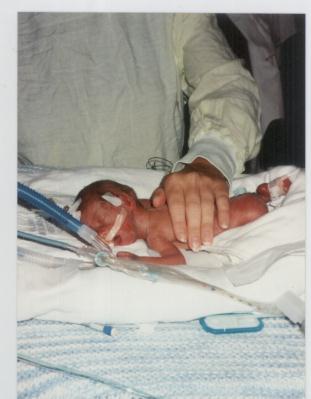
The day of his birth we were told that 6 or 7 out of 10 babies born at 25 weeks survive. Of those who don't survive, most are lost within the first 48 hours.
Thomas did well not just for that unsure 48 hours, but for the next week. Preemies who survive tend to go through what is called a "honeymoon period" where things tend to go very well for about a week before any real decline is seen. It is during this period that the baby adjusts to life outside the womb. We were warned that things were likely to get much worse before they got better.
Thomas had an excellent honeymoon period. Although he was on a respirator (and would be for the next several weeks) his settings were fairly low (compared to what they could have been). On Friday of the week of his birth (he was born on a Tuesday), his mother and I were even allowed to hold him a little bit -- respirator tubes and all!
About a week after his birth, we encountered some problems. Thomas had been getting blood transfusions to maintain whatever it is that must be maintained in his blood supply and also to replace the blood that was constantly being drawn for lab tests. After taking his blood, it was noticed that the wound would continue to bleed beyond what was liked by the health care professionals. Although it wasn't a major concern, we were asked for family history in this area.
During that second week, Thomas had a brain bleed (intraventricular hemorrhage). Although quite common in preemies, especially extremely premature babies like Thomas, it was rather disconcerting. Many of the major handicaps of preemies seem to be traced back to these brain bleeds. Fortunately, Thomas' bleed was said to be fairly minor (a grade 1 interventricular hemorrhage).
Normal room air is approximately 21% oxygen. Thomas' respirator oxygen requirements had tended to range in the 20's to 40's, percent wise, during his first couple of weeks. During the third week, his requirements increased drastically into the 60 to 90 percent range. Thomas was put on antibiotics (as a precaution) and tested for infection. Although the 24 and 48 hour cultures were negative, the 72 hour culture came back positive. The antibiotics were continued and we had a nervous few days.
The doctors decided to use steroids (decadron) to see if that would ease his oxygen requirements. We were warned that he would be fussier on the steroids and would continue to dislike being touched. Since he had been sick, he had been unable to handle our touch very often.
From the very beginning, we had been encouraged to visit, talk to him and carefully touch him (my wife visited every single day of his four month hospitalization and I only missed 5 days). Preemies have an immature nervous system which can only handle one thing at a time, so we were encouraged to approach him slowly with only one sensation at a time.
The steroid had the appropriate effect, his oxygen requirements went back down, the pressure and rate settings were set less than aggressive, and he seemed much better during his forth week.
Around this time, Natalie and I learned what a "Brady" spell was. A brady, or bradycardia was when his heart rate fell below 100. It usually was related to a "de-sat" or desaturation where the oxygenation of the blood fell and stayed below 85. Usually, a brady would follow an "apnea" spell, which was when he would forget to breathe for 15 seconds or more. As long as he was on a respirator, these spells weren't a great concern. The ever attentive nursing staff would turn his oxygen up (to 100% if necessary) or, occasionally, "bag" him with a hand pump that forced air into his lungs.
His mother and I became accustom to these spells. However, other family members found them to be very disconcerting.
When you saw these episodes everyday and were assured by the nursing staff that it was par for the course, you stopped being alarmed (as long as he was properly attended to by the staff). As our comfort level in the NICU increased, we would even assist the staff by stimulating him (a pat on the back or behind would usually "remind" him to breathe) or turning up the oxygen according to the staff's instructions.